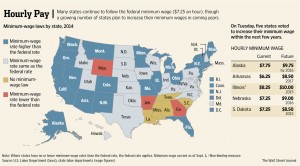Election day 2014 brought more than just a wave of new Republican politicians, it also brought a wave of minimum wage increases across the country. For employers with operations in multiple states, payroll just got more complicated. Five states approved minimum wage hikes, including Alaska, Arkansas, Nebraska and South Dakota. Illinois approved a non-binding measure which won’t immediately impact current law.
Alaska voted to raise its minimum wage to $9.75 by 2016; Arkansas will raise the minimum wage to $8.50 by 2017; Nebraska’s minimum wage will rise to $9.00 by 2016; and South Dakota’s minimum wage will increase to $8.50 by 2015. Illinois voters approved a non-binding measure to raise its minimum wage to $10.00. The cities are also getting into the game with San Francisco voting to increase its minimum wage to $15.00 by 2018, matching Seattle with the highest minimum wage in the country.
The takeaway from the election i s that HR departments are going to have to work overtime to keep up with the patchwork quilt of minimum wage laws across the country. If you have employees who travel across state lines or into city limits with a higher minimum wage (even if they don’t live or office in those locations), you may have obligations under the respective laws. Also, the increases in minimum wage will have a ripple effect on wages in these regions. Employees who were comfortably above minimum wage may now find themselves working for slightly above the new rates, which will drive wage inflation up the chain.
s that HR departments are going to have to work overtime to keep up with the patchwork quilt of minimum wage laws across the country. If you have employees who travel across state lines or into city limits with a higher minimum wage (even if they don’t live or office in those locations), you may have obligations under the respective laws. Also, the increases in minimum wage will have a ripple effect on wages in these regions. Employees who were comfortably above minimum wage may now find themselves working for slightly above the new rates, which will drive wage inflation up the chain.
Lastly, this election is likely not the end of the road for local minimum wage hikes. There have been 15 states with minimum wage ballot measures since 1996 and all 15 have passed. This trend is likely to continue and, if anything, only pick up steam.


Leave a Reply